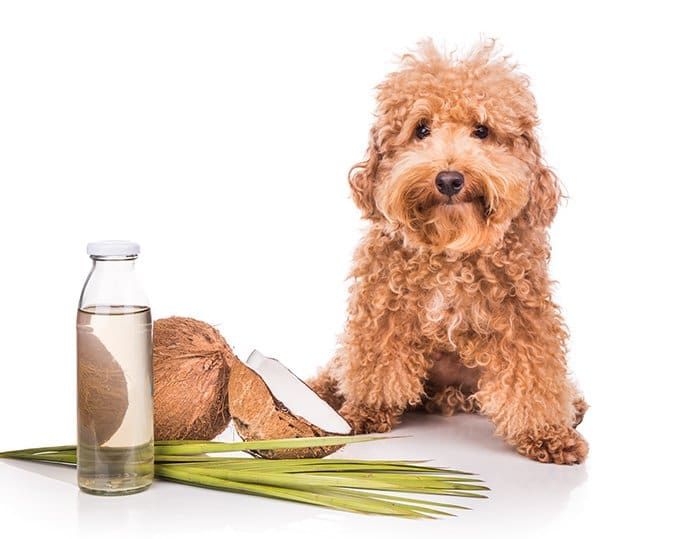Many common foods in the human diet are great for dogs too. Some foods, of course, are toxic to dogs, like onions, grapes, and chocolate. Other foods are nontoxic to dogs, but aren’t healthy either, like ice cream and bacon. (Newsflash: these are bad for you too.) Overall, people foods that are poisonous to dogs are really the exception, not the rule.
The canine digestive system has evolved alongside humans’ for longer than history has been recorded; they’ve adapted to eat a lot of what we eat, and get nutrients from a variety of foods you simply don’t find wild dog species munching on in their respective habitats (namely, grains).

Dreamstime
There are foods people designate strictly for human consumption which our dogs could (and arguably should) be eating regularly too. Yogurt and eggs top that list. Raw honey is a well-known and tasty way to treat canine ailments like kennel cough and topical wounds. And do you personally know a dog who can resist a scoop of peanut butter when presented with one? These are the more widely accepted human foods for dogs, but there are plenty of other great foods to taste-test with your dog.
Let’s explore 10 less obvious human foods for dogs, which you can add to a store-bought dog food or include in your home-prepared diet plan. The following foods can be as nutritious to dogs as they are to people, but please always consider your specific dog’s needs and sensitivities when feeding new things. Just like humans, dogs can be allergic to or intolerant of any type of food.
10 Human Foods for Dogs
1. Oatmeal
Dogs do not need to eat grains as part of a complete canine diet, but most of them can without problems. Oatmeal is one of the better grain choices for dogs, as long as it is cooked. High in fiber, oatmeal is very binding in the digestive tract. For dogs with irregular bowel movements or just a case of diarrhea, a little oatmeal can do wonders.
2. Avocado
Some sources say avocado is toxic to dogs and to never feed it. At Whole Dog Journal, we know that isn’t true. The concern with dogs eating avocado is around a chemical called persin, which is present in the highest amounts in the avocado skin and seed, which are not fed to the dog anyway. The potassium and fiber levels of avocados make them a worthy addition to your dog’s diet, just make sure you don’t feed too many, as they are quite caloric and high in fat.

Juana María Gonzalez Santos | Damedeeso/Dreamstime
3. Pineapple

Dreamstime
Pineapple is fine for most dogs if it is fresh, skinned, and cored. Canned pineapple is generally packaged in a corn syrup liquid – no good for dogs, as we know processed sugar can lead to obesity and diabetes. But freshly sliced pineapple chunks make naturally sweet treats for dogs, whether straight from the core or frozen. The skin of pineapples has a spiny, scaly texture that gives the fruit its signature look. Your dog probably won’t want to eat the skin, but don’t give him access to it regardless. The rough skin and large, hard cores of pineapples present choking and esophageal damage hazards to dogs who try to swallow them.
4. Turmeric
The practice of using turmeric as an anti-inflammatory aid dates back about 4,000 years with roots in India. It is antibacterial, anticoagulant, anticarcinogen, and anti-inflammatory. Though there are few existing clinical studies on how turmeric directly benefits dogs, the anecdotal evidence that turmeric works as an anti-inflammatory for dogs is robust. For dogs with arthritis, especially, feeding this ancient spice as a supplement in their food can really improve mobility and comfort.

Dreamstime
5. Blueberries
Dogs have no problem digesting (and enjoying) blueberries. Of course, there is always the possibility that your specific dog is allergic to berries – try feeding your dog just a few at first. Blueberries, because of their size, sweetness, and nutritional contents, make excellent training treats. They are a great way to keep your dog hydrated and engaged during summer training sessions!
6. Cinnamon
Cinnamon is another spice we humans use in our food often but may not think to share with our dogs. Dogs tend to like the taste of cinnamon, and similar to turmeric, the antioxidant and anti-inflammatory properties of this spice make it a good remedy for arthritis pain in dogs.
7. Basil
Fresh green herbs of most varieties are great additions to a dog’s diet. Like any new food, you should monitor your dog after feeding basil or other herb in case of allergies. The phytonutrients and essential oils present in fresh basil leaves have insect-repelling and anti-inflammatory properties, and their wonderful smell and taste make them easy for dogs to eat in moderation.
8. Cayenne
Cayenne peppers are spicy – hotter than chili powder and found consistently in Mexican and Cajun food. So how could this burn-inducing spice be good for dogs? Turns out cayenne is the most effective herbal remedy for heart disease in dogs. Cayenne improves nutrient absorption in the body, for both dogs and people, and is surprisingly soothing when applied to topical wounds. There are precautions you need to take if a cayenne supplement is something you’d like to try with your dog, however.

© Detzi | Dreamstime.com
9. Sardines
For anyone who cooks their dogs’ meals themselves, the concept of dogs ingesting canned sardines is not anything new. Considered a top source of the healthiest fats for dogs (EPA and DHA), sardines packed in water without salt make excellent additions to store-bought and homemade dog foods. Just be sure to avoid feeding fish packed in olive oil, or any oil for that matter. Oils like corn, safflower, sunflower and olive are quite rich in omega-6 fatty acids, which are not an essential component of the adult dog diet (but are for puppies – see here to learn more) and can be overfed.
10. Coconut oil
Whole Dog Journal readers have heard about coconut oil for dogs before. Packed with lauric and caprylic acid, which kill fungus and balances insulin, coconut oil is well documented to fight topical and internal infections in dogs. Dogs typically like the taste of coconut oil, so adding it to a dog’s normal food is rarely a problem. Perhaps the best reason to feed your dog coconut oil is for its deodorizing properties – if your dog tends to be smelly and greasy, we seriously recommend adding coconut oil to his food. There is much documentation of skin and coat improvements in dogs who are given a daily dose of coconut oil.







Watermelon! Great as a training treat, with the added benefit of hydration
My dog loves corn off the cob. I pop a whole ear in the microwave for 3 minutes and then run it under cold water until it is cool enough to peel. After that I cut the kernels off with a serated knife. His breeder cautions not to feed too much but I know that already.
What besides peanut butter would be good to put on licky mat?